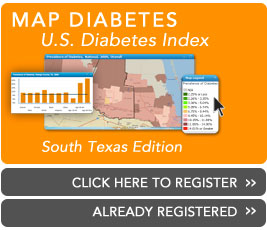Posted by Diabetes Rio Grande
News
Thursday, August 20th, 2015
American Association of Clinical Endocrinologists, 9 April 2015
JACKSONVILLE, Fla.– The American Association of Clinical Endocrinologists (AACE) today announced the publication of new, expansive diabetes clinical practice guidelines and an updated diabetes algorithm to assist clinical caregivers with the medical management of patients with diabetes mellitus (DM).
The 2015 guidelines advocate for comprehensive control of diabetes beyond a simple focus on glycemic control to address multiple DM risk factors. The guidelines promote individual patient goals and the development of a personalized management plan. To that end, comprehensive clinical recommendations are offered for assessing and managing obesity, lipid disorders, hypertension, kidney disease, cardiovascular disease, hypoglycemia and anti-hyperglycemic therapy to prevent complications; most have been modified substantially over previous guidelines. Read more.
Posted by Diabetes Rio Grande
News
Thursday, August 20th, 2015
Brookings, 6 April 2015
The Rio Grande Valley (RGV) Accountable Care Organization (ACO) uses a wide array of strategies to help their patients with diabetes – approximately 45 percent of their patient population – better manage their condition. The diabetes initiatives aim to support patients to understand their disease, undergo lifestyle changes, and systematically employ diabetes management approaches. All practices utilize care coordinators, who reach out to patients with uncontrolled diabetes as often as every other day. In these regular contacts, the care coordinator can check-in with the patient to see how they are doing and make any medication adjustments necessary. Other initiatives include weekly uncontrolled diabetes clinics, where diabetics can see a nutritionist after their provider visit, and a central Diabetes Education Center that provides additional support to practices and their patients. Read more.
Posted by Diabetes Rio Grande
Clinical Trials
Thursday, August 20th, 2015
Diabetes Care, March 2015
OBJECTIVE To compare pharmacokinetics (PK) and pharmacodynamics (PD) of insulin glargine in type 2 diabetes mellitus (T2DM) after evening versus morning administration.…
CONCLUSIONS The PD of insulin glargine differs depending on time of administration. With morning administration insulin activity is greater in the first 0–12 h, while with evening administration the activity is greater in the 12–24 h period following dosing. However, glargine PK and plasma C-peptide levels were similar, as well as glargine PD when analyzed by 24-h clock time independent of the time of administration. Thus, the results reflect the impact of circadian changes in insulin sensitivity in T2DM (lower in the night-early morning vs. afternoon hours) rather than glargine per se. Read more.
Posted by Diabetes Rio Grande
Clinical Trials
Thursday, August 20th, 2015
Diabetes Care, 17 June 2015
OBJECTIVE To evaluate the impact of exercise training (ET) on metabolic parameters among participants with type 2 diabetes mellitus (T2DM) who do not improve their cardiorespiratory fitness (CRF) with training.…
CONCLUSIONS ET is associated with significant improvements in metabolic parameters irrespective of improvement in cardiorespiratory fitness. Read more.
Posted by Diabetes Rio Grande
News
Thursday, August 20th, 2015
Rivard Report, 2 July 2015
“When it comes to diabetes, San Antonio is winning battles everyday, but we’re losing the war.” said Dr. Thomas Schlenker, director of Metropolitan Health District in San Antonio.
Dr. Schlenker addressed his health care allies with gravity at the latest meeting of the new San Antonio Diabetes Collaborative on Tuesday.
According to Metro Health, 18% of Bexar county’s population is diabetic. The national average is 7%. In addition, 35% of Bexar county residents are classified as “pre-diabetic,” when a person’s blood sugar is high, but not technically high enough be classified as Type 2 diabetes. Read more.
Posted by Diabetes Rio Grande
Clinical Trials
Thursday, August 20th, 2015
Diabetes Care, 9 September 2014
OBJECTIVE To assess the efficacy/safety of canagliflozin, a sodium–glucose cotransporter 2 inhibitor, compared with glimepiride over 104 weeks in patients with type 2 diabetes inadequately controlled with metformin.…
CONCLUSIONS Canagliflozin provided durable glycemic improvements compared with glimepiride and was generally well tolerated in patients with type 2 diabetes receiving background treatment with metformin over 104 weeks. Read more.



























